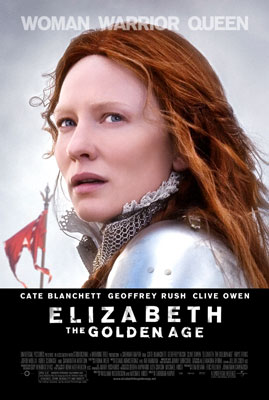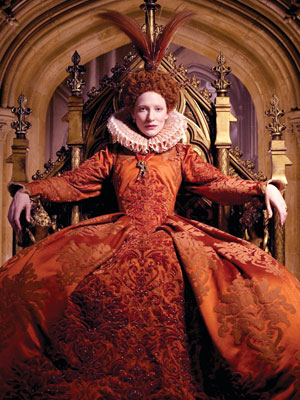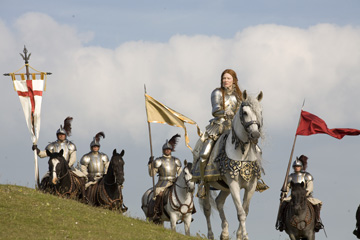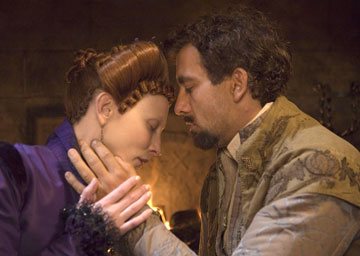 Ten years ago, I walked out of Gillian Armstrong’s Oscar & Lucinda convinced of two things: 1) a massive glass cathedral floating down a river is as oppressive a visual metaphor as a crucified Jesuit tumbling over a waterfall, and 2) the lead actress cast opposite Ralph Fiennes would be one of her generation’s best. One year later, there was Elizabeth, an Oscar nomination, and dominion for Cate Blanchett.
Ten years ago, I walked out of Gillian Armstrong’s Oscar & Lucinda convinced of two things: 1) a massive glass cathedral floating down a river is as oppressive a visual metaphor as a crucified Jesuit tumbling over a waterfall, and 2) the lead actress cast opposite Ralph Fiennes would be one of her generation’s best. One year later, there was Elizabeth, an Oscar nomination, and dominion for Cate Blanchett.
Of course, it took the AMPAS another six years to atone for passing Blanchett over in favor of Gwyneth Paltrow (who was just really good in Shakespeare in Love), but even with a Best Supporting Actress Oscar for her spot-on Katharine Hepburn embodiment in Martin Scorsese’s The Aviator, many feel the grievous error of 1998 won’t be completely rectified until Blanchett claims her very own Actress trophy. Thus far, this has proven problematic. Though the Academy will gladly cough up the hardware for a showy performance in a ho-hum movie if they decide it’s your time (think Jessica Lange in Tony Richardson’s Blue Sky), you’ve still got to do a little better than Charlotte Gray, Veronica Guerin and The Missing.
Given Blanchett’s willingness to take what the Academy would consider "supporting" turns in ensemble works and two-handers, it’s quite clear that the Best Actress chase means less to her than it does to the rest of the entertainment community. Working with the best in her business seems to be what turns her on. That said, if you want to get Oscar voters worked up, you can’t beat returning to the role that made you an international movie star and a lamented Best Actress bridesmaid.
So here comes Blanchett in "Part Two" of what director Shekhar Kapur would like to be a trilogy of films about The Virgin Queen. Elizabeth: The Golden Age covers some of juiciest imbroglios of the monarch’s reign, including the Anglo-Spanish War, the execution of Mary Stuart (played by a psychotic Samantha Morton) and a speculative, unrequited romance with Sir Walter Raleigh (Clive Owen). Kapur and his screenwriters, William Nicholson and Michael Hirst, cram as much history as possible into the two-hour run time, but wars and conspiracies and assassinations feel like needless distractions when you’ve got Blanchett facing off with the likes of Owen, Geoffrey Rush and an impressive Abbie Cornish.
The below press conference was conducted at the Regent Beverly Wilshire, and while I wouldn’t say Blanchett was at all "uneasy" during the session, she did seem eager for it all to be over. This isn’t to suggest she was rude; on the contrary, Ms. Blanchett was thoughtful in her answers and somewhat playful – particularly at the outset. But when she confessed that she’d like to switch off the recorders and microphones arrayed in front of her, I 100% believed her.
Cate Blanchett: (Settling in at the table) I’m just going to move this back a little bit. Otherwise, I’m going to have nowhere to put my elbows. (Jostles with a microphone the size of Sweet Sweetback’s manhood.) I promise I’m not going to turn any of them off. Although, I’d like to. (Laughter)
Q: What’s the point of interviews anyway?
Blanchett: Exactly! We can all go home! You’ve seen the movie!
Q: You very reluctant to take this on.
Blanchett: Today? Yes, that’s true. (Laughter)
 Q: You were very reluctant to take this movie on. Why did you change your mind? And how are you able to juggle your commitments to the Sydney Theatre Company, your family and your various film roles?
Q: You were very reluctant to take this movie on. Why did you change your mind? And how are you able to juggle your commitments to the Sydney Theatre Company, your family and your various film roles?
Blanchett: First part of the question: what convinced me was time. The minute we finished the first one, Shekhar was talking about me not only playing Elizabeth again, but hundreds of other ideas. We’ve remained friends, and we’ve talked about various projects. And Tim Bevan from Working Title just said, "Look, just let us work a script up, and if it doesn’t work, it doesn’t work." I found that the notion of the love triangle, the very structure of the narrative was quite different – because I’d always said that if they did another one, Elizabeth shouldn’t be the central character. But the structure of the romance – and it is an unabashedly romantic film – was quite different, so it didn’t feel like treading the same ground.
And also, then, knowing Geoffrey and Clive were on board, and that Remi [Adefarasin] was going to shoot it. And working with [costume designer] Alexandra Byrne again; she’s a genius, I think.
In answer to your second question… the commitment to the Sydney Theatre Company, we officially take over as co-Artistic Directors, my husband Andrew Upton and I, on the first of January. Things have begun; Andrew’s been there all year as an Artistic Associate, and I’ve been coming and going. Obviously, it takes a long time; these are some deep time projects that we’ve begun to set up already. But officially we don’t start until January 1st.
Q: Cate, congratulations on the Best Actress win for I’m Not There at the Venice Film Festival.
Blanchett: (Beaming) It was cool, wasn’t it? I was very surprised and pleased.
Q: People are automatically putting you in the mix for the Oscars again. You’ve already won for playing Katharine Hepburn, and now you’re playing another famous person who’s…
Blanchett: A man.
Q: Can you talk about what is irresistible for you as an actress? Are you drawn to playing someone real? There have been so many interpretations of Eizabeth.
Blanchett: There’s a long and glorious legacy of actresses who’ve played Elizabeth I: Flora Robson, Bette Davis, Glenda Jackson, Helen Mirren, Anne-Marie Duff. She’s constantly reinvented. One of my favorite plays is [Friedrich] Schiller’s Mary Stuart, which is about a fictitious meeting between Mary Queen of Scots and Elizabeth I. She’s ripe for reinvention because she’s such an enigma. Also, if you think about the Elizabethan Age, when English culture as we know it was crystallized, it’s a fascinating period of history. I think there will be many more Elizabeths after this film. She’s a fantastic – particularly for a director like Shekhar – leaping-off point for a story.
Q: Contrast playing Elizabeth I with playing someone as iconic as Bob Dylan.
Blanchett: Well, Elizabeth I is iconic as well. Look, I think I run 100 miles-an-hour away from projects every single time. In the end, the one’s that stick are the ones that pursue you, that you can’t say "no" to. And the idea of playing Bob Dylan was just so utterly ludicrous that, of course, I had to take it. It was daunting.
But I was a bit nervous about returning to a character that, I suppose, had allowed me to walk into a door to an international film career. You don’t ever want to feel like you’re going backwards. So once I could see that I could progress forward through playing it, then it became exciting to me.
 Q: Can you talk about the first day of shooting, when you got back into Elizabeth’s skin?
Q: Can you talk about the first day of shooting, when you got back into Elizabeth’s skin?
Blanchett: It was quite organic. Obviously, I started with Morag Ross, who did the hair and makeup, and Alex Byrne. We’d had long, long discussions about where to start. In the end, no matter how much research you do, you’re telling the particular story that the script and the director prescribe. The great thing about Shekhar and I working together is that I’m fascinated by history, and he’s utterly disinterested. So I think we temper one another really well. We did a lot of research, but in the end you have to say she’s starting off at a point where we kind of left her in the last film – except she was at a point of utter rigidity in the end of Elizabeth. How does one exist in that rigid place? We had to open that up a little bit.
But it felt strange. It was like there was an echo in the room, but yet it felt very fresh. Shekhar and I and Abbie, because I don’t think she’d seen [Elizabeth]… we watched it just before we started to film. I was incredibly uncomfortable with the notion of "Oh, god, it’s ten years later; have I aged that much?" Being an actress in film is like aging in dog years. (Laughter) But I was surprised by how well it stood up. I thought, "Well, that’s that. It is its own thing." And I was excited that [The Golden Age] was at once an echo, in that you’ve got the same creative team and a few of the same characters, but it was its own creature. It’s a much more interior film despite the epic backdrop. It was a bit like a homecoming, but I think I was uncomfortable in a healthy, useful way.
Q: I have a two-part question: first, if you’d just talk about your role in Indiana Jones 4, and-
Blanchett: I can’t. I’ll be shot. (Pause) And so will you. (Laughter)
Q: Well, you’ve talked about playing iconic characters; could you talk a little bit about joining an iconic franchise?
Blanchett: It’s such a well-oiled, iconic franchise – one which I grew up with. On the first day of shooting, it was extremely surreal. I was watching the monitor as Steven set up the frame, and I knew the iconography of the frame: I knew the layout and I knew the way these things are lit. So when I had to enter the frame, it was a real Zelig moment.
So it’s been fantastic and so much fun, and my boys have had an absolute ball.
Q: Are they sworn to secrecy, too?
Blanchett: Yes.
Q: One of the things that’s so interesting about your performances as Elizabeth in these movies are the subtle changes in your face that convey all these different moods.
Blanchett: You can say it. Age. (Laughter)
Q: I don’t think that at all. What do you do to distinguish each little look to convey these feelings?
Blanchett: I think it’s tricky, but vital as an actor working in film that you have a sense of the third eye, in that you’re aware of what you’re projecting, but not in a self-conscious way. I think if you’re internally engaged with the set of feelings and emotions, and also the actions that you’re trying to play on the other actor, then that will, externally, take care of itself. I didn’t think about that on the day that much. You think about it, obviously, when you get into hair and makeup; it is a form of masking up. But even when you’re in your Elizabethan war paint, you don’t want that mask to be opaque. It has to be transparent. So, hopefully, there was a transparency to it.
Q: Is this a fictionalized history, historical fantasy or is it the exploration of legend?
Blanchett: I think it’s all three. In the end, when you only have a couple of hours to tell an incredibly dense period of history, by the process of selection you’re already telescoping the events, and you’re automatically saying, "This event has more significance than the one that’s been omitted." It’s never going to be like reading the letters and the court documents, or reading Alison Weir’s biography of Elizabeth. It’s not the same experience. But going to see a film shouldn’t be. You are being told a fable through the eyes of that director. It’s very temporal, too, filming. Hopefully, the film has a contemporary quality. I think, like with all good stories, if they’re able to connect to the current collective consciousness, what we’re all thinking about – and what it means to be female now, as opposed to being female then.
Q: Could you talk about Elizabeth and Sir Walter Raleigh’s romantic chemistry? It seems like their timing is off.
Blanchett: Timing is everything, isn’t it? What interested me about the relationship between Raleigh and Elizabeth in this particular incarnation of this set of events was that there was a vicariousness to it. I think that happens in a lot of so-called love relationships; you almost want to be the person as much as you want to possess the person. I think there were a lot of male courtiers over the years that Elizabeth had strong connections with, and I think she was probably fascinated by the freedom that was afforded – not only to an adventurer like Raleigh, but also the men in the court that could travel a lot more freely than she could. She never left the shores of England.
 Q: You have incredible romantic chemistry with Clive.
Q: You have incredible romantic chemistry with Clive.
Blanchett: I think every woman who works with Clive has incredible romantic chemistry. (Laughs)
Q: Is he a charmer in real life?
Blanchett: No, he’s very frank and open and not at all self-conscious. I think that’s incredibly attractive when somebody is as incredibly attractive as he is.
Q: When Elizabeth says "I have a hurricane in me," we believe her. What do you hold inside that makes you so believable as an actress?
Blanchett: Oh, god, I am utterly the wrong person to answer that question. I have no idea. Hopefully, I have a rich set of life experiences that I’m able to draw on, but, at the same time, I’m not at all interested in playing myself or imposing my own value system onto a character. It’s like having conversations continually with like-minded people: you get a very skewed perception of the way the world works. So I like having conversations with characters who think in very different ways and have very different sets of experiences.
Q: Is being an international movie star like you are kind of like being a queen in the sixteenth century?
Blanchett: (Almost choking on her water) No. And anyone who says that is insane.
Q: Well, Elizabeth had a very hard time finding a mate due to her position. She was the Queen. Today, women who have successful careers, like yourself, can find happiness. Do you think there’s a significant difference?
Blanchett: I was reading Joan Didion’s The Year of Magical Thinking again the other day, and she referred to various psychologists who were analyzing the notion of grief and the grieving process, and saying that, somewhere along the way in the last century, there became this notion that we all need to be happy. So no one fully grieves anymore because we can’t be seen to be unhappy. The notion of happiness to someone in Elizabeth’s position is a strange one; I think it’s a very modern concept, that happiness is something that we must not only strive for, but can achieve in this lifetime. I think Elizabeth’s situation was entirely different. And in relation to what you’re saying about finding a companion, the reason for getting married was deeply unromantic. It was to do with securing a nation. It was a political tool: women were used as part of the political negotiation process between countries. And the fact that Elizabeth claimed that political machination for herself meant that the prospect of finding love was very elusive. The history books say – and, or course, they were written by courtiers at the time – the closest she came was the Duke of Anjou. But in Shekhar’s first film, the Duke of Anjou was a raving transvestite. (Laughter) So everything’s up for grabs in these films.
Q: In the movie, it seems like Elizabeth teeters on the verge of madness. I’m wondering how much you played with that idea.
Blanchett: It’s interesting. I don’t think I thought about it a lot. I did it in about three or four scenes, one of which was cut because they were talking about Mary Stuart, and I think they decided there was a bit too much discussion about Mary Stuart. But I tried to see through it… her self-medicating with herbs and being physically unstable, because I thought at the time that I’m playing her she would’ve been quite menopausal. She was going through "the change". (Laughing) I think at the time I kept telling Reni to take off the twelve denier stockings he was shooting me through to show a few more wrinkles. But Shekhar likes women to look beautiful.
But in terms of that madness, it was not only what was going on with her psychologically, but what was going on with physically. I think it’s great that you got a little texture of that, but I think the whole complexity of what I was trying to do maybe wasn’t in the film.
Q: (From a Spanish journalist) Do you think, if it weren’t for Elizabeth, England would be speaking Spanish today?
Blanchett: (Laughing) Quite possibly. But it’s a really interesting thing to look at the history of failure. If we analyze history by the failures that took place rather than the victories… they’ve influenced us incredibly. Absolutely, the world would’ve been a very different place.
Q: Was there any talk of having Elizabeth and Mary Stuart sharing a scene in this film?
Blanchett: I would’ve loved it. I think Samantha Morton is incredible. She’s such a dangerous, exciting and unusual presence on screen. I so admire her work. If anyone is ever going to do the Schiller [play], I’d be there with her, absolutely.
Elizabeth: The Golden Age opens nationwide this Friday, October 12th.